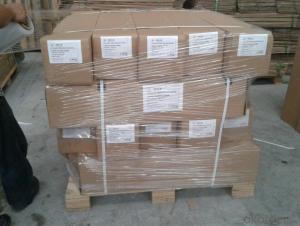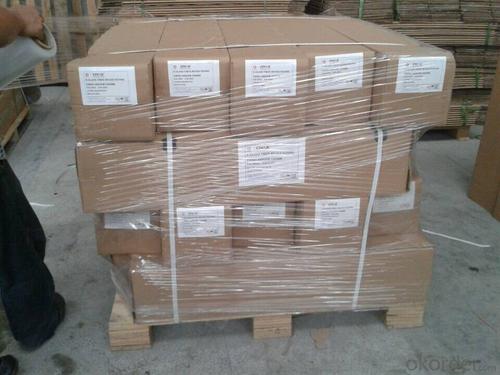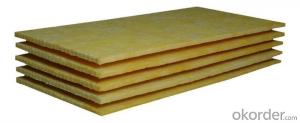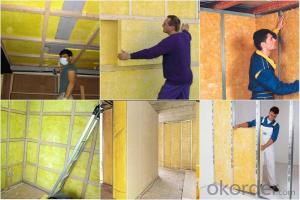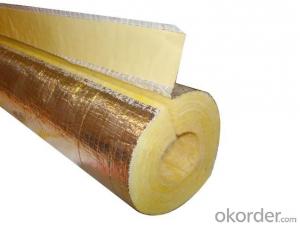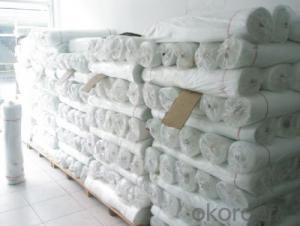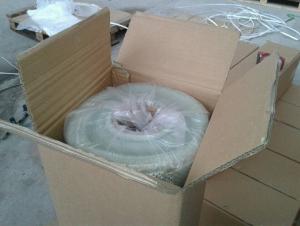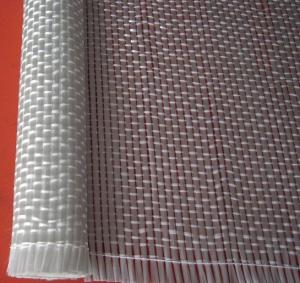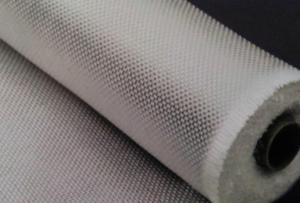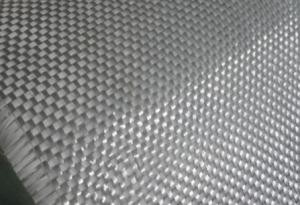E-Glass/C Glass Fiberglass Mat Tissue Woven Roving
- Loading Port:
- Shanghai
- Payment Terms:
- TT or LC
- Min Order Qty:
- 16000 kg
- Supply Capability:
- 160000Kg Per Month kg/month
OKorder Service Pledge
OKorder Financial Service
You Might Also Like
1.Brief Introduction
Woven Rovings are compatible with unsaturated polyester, vinyl ester, epoxy and phenolic resins.
Woven Rovings are a high-performance reinforcement widely used in hand lay up and robot processes to manufacture boats, vessels, plane and automotive parts, furniture and sports facilities.
2.Product Features
Warp and weft rovings aligned in a parallel and flat manner, resulting in uniform tension
Densely aligned fibers, resulting in high dimensional stability and making handling easy
Good moldability, fast and complete wet out in resins, resulting in high productivity
3.Product Specifications
Property | Area Weight | Moisture Content | Size Content | Width |
(%) | (%) | (%) | (mm) | |
Test Method | IS03374 | ISO3344 | ISO1887 | |
EWR200 | ±7.5 | ≤0.15 | 0.4-0.8 | 20-3000 |
EWR270 | ||||
EWR300 | ||||
EWR360 | ||||
EWR400 | ||||
EWR500 | ||||
EWR600 | ||||
EWR800 |
Special specification can be produce according to customer requirements.
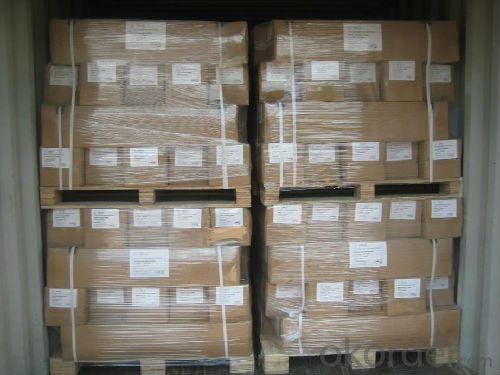
4.FAQ
Packaging:
Each woven roving is wound onto a paper tube which has an inside diameter of 76mm and the mat roll has a diameter of 220mm. The woven roving roll is wrapped up with plastic film,and then packed in a cardboard box or wrapped up with kraft paper. The rolls can be horizontally placed. For transportation, the rolls can be loaded into a cantainer directly or on pallets.
- Q: Can fiberglass mat tissue be used for making insulation blankets?
- Yes, fiberglass mat tissue can be used for making insulation blankets.
- Q: Can fiberglass mat tissue be used for HVAC insulation?
- No, fiberglass mat tissue is not typically used for HVAC insulation. HVAC insulation usually requires materials that are specifically designed to have high thermal resistance and to prevent the transfer of heat or cold air. Fiberglass mat tissue is commonly used as a reinforcement material in the fabrication of composite materials, such as fiberglass panels or structures, rather than as insulation. Insulation materials for HVAC systems are typically made from materials like fiberglass insulation boards, foam insulation, or mineral wool, which have better thermal resistance properties and are specifically designed for HVAC applications.
- Q: Is fiberglass mat tissue suitable for chemical storage tanks?
- Yes, fiberglass mat tissue is suitable for chemical storage tanks. It is highly resistant to corrosion caused by various chemicals and provides excellent strength and durability to withstand the harsh conditions of chemical storage. Additionally, it helps in preventing leakage and ensures the long-term integrity of the tanks.
- Q: How does fiberglass mat tissue compare to polyurethane insulation?
- Fiberglass mat tissue and polyurethane insulation are two commonly used materials in the construction industry, but they have distinct differences in terms of composition, performance, and applications. Fiberglass mat tissue is made from glass fibers that are woven into a mat-like structure. It is primarily used as a reinforcement material in various applications such as roofing, wall insulation, and fiberglass composites. The main advantage of fiberglass mat tissue is its high tensile strength, which provides excellent structural support and durability. It is also resistant to fire and chemicals, making it a suitable choice for applications where safety is a concern. On the other hand, polyurethane insulation is a foam material that is known for its excellent thermal insulation properties. It is commonly used in buildings to reduce heat transfer and improve energy efficiency. Polyurethane insulation has a high R-value, which indicates its ability to resist heat flow. This makes it an ideal choice for insulation purposes, especially in areas with extreme temperature conditions. Additionally, polyurethane insulation is lightweight, easy to install, and has good moisture resistance. When comparing fiberglass mat tissue to polyurethane insulation, it is important to consider the specific needs and requirements of the project. Fiberglass mat tissue is more suitable for applications that require structural reinforcement, such as roofing and composite materials. It provides excellent strength and durability, making it a preferred choice for such applications. On the other hand, polyurethane insulation is more effective in terms of thermal insulation. It offers superior heat resistance and has a higher R-value compared to fiberglass mat tissue. Therefore, if the primary goal is to improve energy efficiency and reduce heat transfer, polyurethane insulation would be the better choice. Overall, fiberglass mat tissue and polyurethane insulation have their own strengths and weaknesses. The decision on which material to use should be based on the specific requirements of the project, such as structural support or thermal insulation needs. Consulting with a professional and considering factors such as budget, environmental impact, and local building codes can help in making an informed decision.
- Q: Can fiberglass mat tissue be used for insulating exterior walls?
- Yes, fiberglass mat tissue can be used for insulating exterior walls. It is a commonly used material for insulation due to its thermal resistance properties and ability to improve energy efficiency in buildings.
- Q: Does fiberglass mat tissue require any special precautions during handling?
- Yes, fiberglass mat tissue does require special precautions during handling. It is important to wear protective gloves, long sleeves, and a mask to prevent skin and respiratory irritation. Additionally, it is recommended to handle fiberglass mat tissue in a well-ventilated area to minimize the inhalation of dust particles.
- Q: Is fiberglass mat tissue suitable for insulation in data centers?
- Fiberglass mat tissue can be suitable for insulation in data centers, depending on specific requirements and considerations. Fiberglass mat tissue is a type of fiberglass insulation that is commonly used for thermal and acoustic insulation purposes. It offers several advantages such as high thermal resistance, fire resistance, and sound absorption capabilities. In data centers, insulation plays a crucial role in maintaining a controlled and stable environment for the sensitive electronic equipment. Fiberglass mat tissue can help in reducing heat transfer, preventing the occurrence of hot spots, and maintaining the desired temperature levels within the data center. It can also contribute to noise reduction, which is important in reducing distractions and ensuring a comfortable working environment for the personnel. However, there are certain factors that need to be considered before determining the suitability of fiberglass mat tissue for insulation in data centers. Firstly, the specific requirements of the data center in terms of thermal insulation, fire resistance, and acoustic control should be thoroughly evaluated. Additionally, the installation process and maintenance requirements should be assessed to ensure that the insulation material can be effectively implemented and maintained in the data center's infrastructure. It is also important to consider alternative insulation options such as mineral wool, foam insulation, or other specialized materials that may better suit the unique demands of data centers. These materials might offer specific advantages like better fire resistance, moisture control, or higher thermal efficiency. Ultimately, the suitability of fiberglass mat tissue for insulation in data centers depends on a comprehensive evaluation of the specific needs, regulatory requirements, and available options. Consulting with experts in the field of data center construction and insulation can provide valuable insights and help in making an informed decision.
- Q: Can fiberglass mat tissue be used for automotive applications?
- Yes, fiberglass mat tissue can be used for automotive applications. It is commonly used in the automotive industry for reinforcement and strength in parts such as body panels, hoods, and interior components. It provides excellent thermal and acoustic insulation properties as well.
- Q: Is fiberglass mat tissue suitable for insulation in HVAC ducts?
- Yes, fiberglass mat tissue is suitable for insulation in HVAC ducts. Fiberglass is a commonly used material for insulation due to its excellent thermal and acoustic properties. It is capable of withstanding high temperatures and is resistant to moisture, making it ideal for ductwork applications. Fiberglass mat tissue provides effective insulation by reducing heat transfer and preventing condensation buildup within the ducts. Additionally, it is lightweight, easy to install, and has a long lifespan, making it a cost-effective choice for HVAC insulation. Overall, fiberglass mat tissue is a suitable and reliable option for insulation in HVAC ducts.
- Q: Can fiberglass mat tissue be used for thermal insulation?
- Indeed, thermal insulation can be achieved through the utilization of fiberglass mat tissue. Comprised of delicate glass fibers that are skillfully intertwined to produce a robust and supple substance, this material boasts remarkable thermal insulation attributes. Its capacity to resist heat transfer and exhibit low thermal conductivity accounts for its excellent properties in this regard. In order to impede the dissipation or absorption of heat, fiberglass mat tissue can be effectively employed to insulate not only walls but also roofs and other surfaces. Within the construction industry, it is a prevalent practice to implement this material with the aim of advancing energy efficiency and curtailing expenses associated with heating or cooling. Moreover, the fire-resistant, moisture-resistant, and durable nature of fiberglass mat tissue renders it highly suitable for an array of thermal insulation applications.
Send your message to us
E-Glass/C Glass Fiberglass Mat Tissue Woven Roving
- Loading Port:
- Shanghai
- Payment Terms:
- TT or LC
- Min Order Qty:
- 16000 kg
- Supply Capability:
- 160000Kg Per Month kg/month
OKorder Service Pledge
OKorder Financial Service
Similar products
Hot products
Hot Searches
Related keywords
